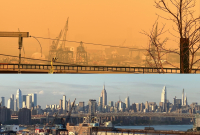Support strong Canadian climate journalism for 2025
Fire has driven Marvin Herman’s family from their home in northwestern Saskatchewan twice in the last month.
“We had smoke and fire very close, like it was in the backyard, and that’s how close it was,” said Herman, 67, who lives in La Loche, a village about 500 kilometres northwest of Saskatoon. Herman said he stepped outside his home at 11 p.m. on a night in early May and saw smoke and fire.
Local firefighters worked through the night, but the next day, a mandatory evacuation was ordered for those most vulnerable to heavy smoke. Buses arrived to take elderly people, young people and those with health issues to safety.
“My wife has asthma, and my grandson, who lives with us, both went on the bus and travelled 10 hours away to Regina,” Herman said.
Herman stayed behind because of work commitments and felt the smoke would be impossible to escape because it was everywhere.
Another evacuation in late May was the second time that month that Herman’s wife and grandson were forced to flee fire. Both evacuation orders ended after four days; they were able to return home on June 4 after the second evacuation.
Canada faces an unprecedented wildfire season this year, as climate change, largely driven by human burning of fossil fuels, creates more days with hot, dry conditions. As of Thursday, the Canadian Wildland Fire Information System reports there are 441 active fires burning across Canada, 236 of which are out of control.
“The fire, smoke and weather are really bad this year. I don't think we had much snow this year. Our water level is low, and the season is dry,” said Herman.
Georgina Jolibois, mayor of La Loche, Sask., told Canada’s National Observer, she and the rest of the council remained in the village during both evacuations to ensure the safety of the community and other residents who stayed behind.
“The experiences were quite challenging,” said Jolibois. “Evacuees were going to the buses to travel to Regina both times.” She heard children asking questions about when they could go home, wondering when their home would once again be safe from fire.
About 2,800 people live in La Loche. The first time there was an evacuation, 200 people left their homes; the second time, it was around 100.
This story was produced in partnership with Journalists for Human Rights for the Afghan Journalists-in-Residence program funded by the Meta Journalism Project.






Comments